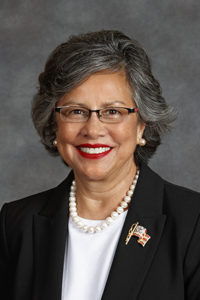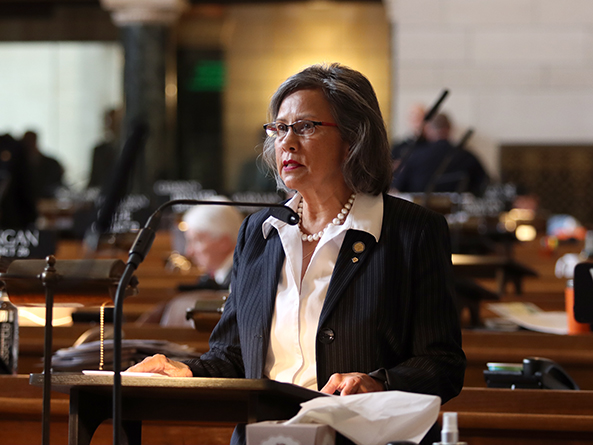Governor’s education funding proposal advances
Lawmakers gave first-round approval April 4 to a bill that would direct additional state funding to K-12 public schools.

Under LB583, introduced by Bellevue Sen. Rita Sanders at the request of Gov. Jim Pillen, the state would pay public school districts $1,500 in foundation aid per student beginning with school fiscal year 2023-24. It also would increase state aid to school districts to help cover their special education expenses.
Sanders said the proposal, part of a larger package that includes income tax cuts, property tax relief and a cap on school revenue growth, would be the largest increase in state aid to public schools in Nebraska’s history at approximately $300 million per year.
An Education Committee amendment, adopted 41-3, would replace the bill with a modified version of the original proposal.
Under the amendment, 23 percent of foundation aid would be paid from a new Education Future Fund, proposed in LB681, sponsored by Sen. Robert Clements of Elmwood.
For school fiscal years 2023-24 and 2024-25, a district’s foundation aid would be included as a formula resource, meaning its state equalization aid would be reduced by an equal amount. Beginning with school fiscal year 2025-26, only 60 percent would be included.
Sanders said the provision is intended to help large school districts, which otherwise would see the new funding offset by a decrease in equalization aid, which is state aid intended to cover the difference between a district’s needs and its local resources, such as property taxes.
Under the amendment, districts also would receive a supplemental special education allowance equal to 80 percent of the district’s total allowable excess costs for special education programs and support services minus the total amount of special education funding it already receives. Supplemental special education allowances also would be paid from the new fund.
Sanders said the proposal also would change the way net option funding is calculated to ensure that districts do not receive both foundation aid and net option funding for a single student.
Finally, the amendment would require each school district to submit an annual report to the state Department of Education that includes the amount of additional state aid it received as a result of the bill and the amount it reduced its property tax request, if any.
Albion Sen. Tom Briese supported LB583, saying it would address a disparity that results in many rural school districts receiving only a small percentage of their funding from the state while larger districts receive much more.
Sen. Danielle Conrad of Lincoln also supported the bill, saying the state can use its strong fiscal position this year to answer the “constant refrain” of school districts about the increasing cost of serving students with special needs.
“It is right and it is appropriate to utilize that historic funding advantage that we have available to … infuse more resources into education,” she said.
Omaha Sen. Justin Wayne opposed the bill, saying lawmakers should direct additional funding to both urban and rural school districts that have a high percentage of students in poverty.
“Why aren’t we taking a targeted approach at our most vulnerable students across the state?” he said.
Glenvil Sen. Dave Murman, chairperson of the Education Committee, agreed that the state school funding formula does not adequately compensate high-poverty schools, but he said LB583 would direct per-student funding to each district for the first time in decades.
Increasing special education reimbursements to 80 percent, when the current statewide average is 42 percent, also would be a “huge positive,” Murman said.
“This is not a perfect bill,” he said, “but it does have a lot of positives in it, and I think it’s maybe the best we can do this year.”
Sen. Tom Brandt of Plymouth, who also supported LB583, introduced an amendment that would combine elements of his LB320 with the committee amendment. In addition to reimbursing schools for special education expenses at the same level as LB583, the amendment would provide each district with 10 percent of its basic funding or at least $1,500 per student.
Brandt’s proposal also would reduce agricultural and residential valuations inside the state school funding formula, which he said would result in more districts receiving equalization aid than under the governor’s proposal.
The amendment would cost approximately $70 million more per year than LB583, Brandt said, and it would use unclaimed income tax credits under the Nebraska Property Tax Incentive Act to cover the difference.
Sanders opposed the amendment, saying Brandt’s proposal has not been vetted to the extent that LB583 has. She also opposed using unclaimed credits to help pay for the additional aid, saying the fund could be drawn down as more people learn about the program, which the Legislature created in 2020.
The amendment failed on a vote of 17-29.
Omaha Sen. Machaela Cavanaugh introduced an amendment that would add a modified version of her LB99 to the committee amendment.
It would require eligible school districts to opt in to a federal reimbursement program, called the community eligibility provision, that allows schools with high poverty rates to serve free breakfasts and lunches to their students without collecting financial information from households.
Cavanaugh’s amendment failed on a vote of 16-30.
After eight hours of general file debate over two days, Sanders filed a motion to invoke cloture, which ends debate and forces a vote on the bill and any pending amendments.
The motion succeeded on a vote of 43-3. Thirty-three votes were needed.
Senators then voted 39-3 to advance LB583 to select file.


